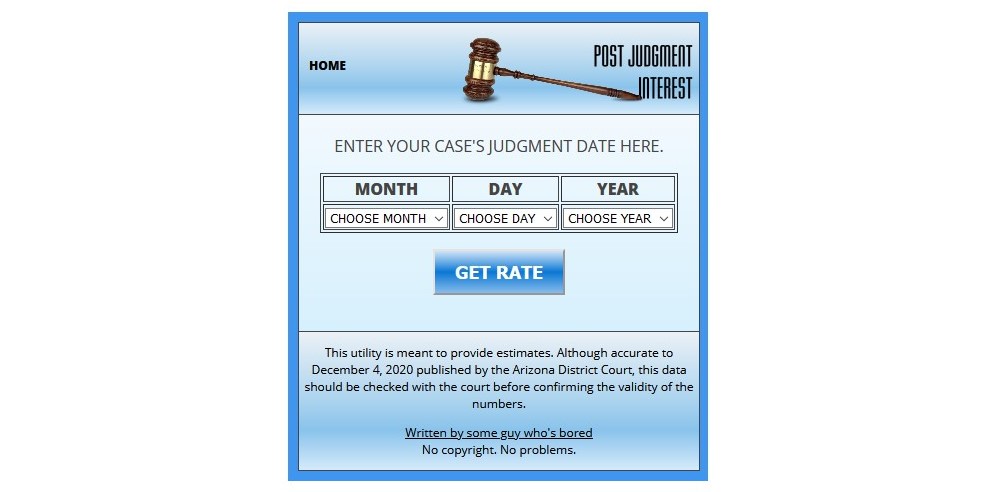Yes I know… boring name… got a better one?
December 15, 2020
POST JUDGMENT INTEREST is free software with no warranty, copyright or other excuse.
Written by Lee Kent Hempfling December 2020 out of sheer boredom
https://leehempfling.com
https://stolenjustice.us
https://countrybeforeself.com
https://modern-mysticism.com
https://thebrainisawonderfulthing.com
https://enticy.org
See the readme.txt file for details contained in the interest.zip file. Oh wait: you are.
Readme:
ABOUT:
This script is written in Practical Extraction and Reporting Language (PERL)
If you are not familiar with PERL just think big monster applications running on Apache servers. Its impressive.
There are no user service-able parts inside so don’t touch anything in the scripts or files it will collapse the space-time continuum. (Seriously the world will end.)
INSTALL:
Create a folder on your web server to place this script. Name it something interesting. Foreign languages are cool. Don’t forget where you made it. 😉
CHMOD the folder to 755. (If you don’t know how to do that, hire a pro or… pretend … it could happen.)
Upload the contents of the zip file (unzip it first!)
See above dire consequences happen without the right security setting.
CHOMD the index.cgi script to 755.
There are no other adjustments to make as long as all parts are in the same folder.
Use a web browser of your choice (don’t use Chrome you are being watched by satan!)
Enter the full address of the new folder your create. The script should automatically load. If it does not then your server is not set up to recognize .cgi extensions as index files.
Fix that.. or contact your server support to fix that or just access the script directly by adding /index.cgi to the folder address.
Once installed:
USE:
Simply access the script and enter the judgment date of your federal civil case.
It will return the interest rate in effect for that date and show you the range of dates that rate applies to.
That’s it.
Simple huh? No so much in code.. But it was fun.
So here it is:
For your information here is a wonderful description of post judgment interest from https://www.avvo.com/legal-guides/ugc/how-is-post-judgment-interest-on-a-civil-judgment-calculated
—————————————————————-
How is post-judgment interest on a civil judgment calculated?
When does post-judgment interest start to run?
Generally, post-judgment interest starts to run on a civil judgment from the date the judgment is entered by the Court. In some courts, the entry of judgments is a function of the Court’s Clerk. So even if a judge signs a judgment on one day, but the Clerk does not “enter” it until a week later, the post-judgment interest would not start to run until the judgment is docketed by the Clerk. When a judgment is considered entered is a product of the civil procedural rules and law applicable to the particular court from which the judgment was issued.
What post-judgment interest rate applies under state law?
At least in New York state, rate of post-judgment interest is set by the civil procedural law titled the Civil Practice Law and Rules (the “CPLR”). CPLR A? 5004 fixes the post-judgment rate of interest at 9% per year and CPLR A? 5003 states that interest shall run from the date of entry of the judgment. Many other states have statutes or rules that fix the post-judgment rate of interest as well. In New York and many other states, the interest is calculated as simple interest and not compounded. There may be states where the applicable rate fluctuates, as with the rate of post-judgment interest on civil judgments entered in the United States District Courts.
What interest rate applies in federal courts?
28 U.S.C. 1961 provides, in pertinent part, “interest [on a civil judgment] shall be calculated from the date of the entry of the judgment, at a rate equal to the weekly average 1-year constant maturity Treasury yield, as published by the Board of Governors of the Federal Reserve System, for the calendar week preceding the date of the judgment.” Each Monday the Federal Reserve publishes the applicable rates for the prior week. A link to the current rate may be found here: http://www.federalreserve.gov/releases/h15/current/. In contrast to many states, e.g. New York, post-judgment interest on a federal civil judgment is compounded.
When is a party entitled to pre-judgment interest?
It depends. I know this is not particularly satisfactory answer. Whether a party is entitled to pre-judgment interest is a complicated question hinging on the facts of a particular case, the claims asserted by the parties and the applicable law and rules of the court in which the dispute has been brought. As a result, I do not take up the subject here, but will be explore it in a future legal guide.
The foregoing is provided for informational purposes only and should not be construed as legal advise. Confer with qualified counsel admitted to practice in the jurisdiction in which the matter arises. The rates in the included database may or may not match those of your jurisdiction. Check first.
—————————————————————-


